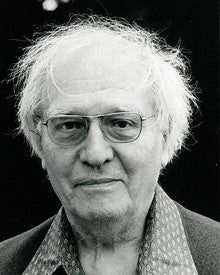
(1908 - 1992)
Olivier Messiaen was the son of Pierre Messiaen, a scholar of English literature and of the poet Cecile Sauvage. Soon after his birth the family moved to Ambert where his brother, Alain was born in 1913. Around the time of the outbreak of World War 1, Cecile Sauvage took her two sons to live with her brother in Grenoble where Olivier Messiaen spent his early childhood, began composing at the age of seven, and taught himself to play the piano. On his return from the war, Pierre Messiaen took the family to Nantes and in 1919 they all moved to Paris where Olivier entered the Conservatoire. From very early on it was clear that Messiaen would be a composer who would stand alone in the history of music. Coming not from any particular 'school' or style but forming and creating his own totally individual musical voice. He achieved this by creating his own 'modes of limited transposition', taking rhythmic ideas from India, ancient Greece and the orient and most importantly adapting the songs of birds from around the world. He was a man of many interests including painting, literature, and the orient where he took in not only the musical culture but theatre, literature and even the cuisine of foreign countries! The single most important driving force in his musical creations was his devout Catholic faith.
Olivier Messiaen Composition Timpani and Percussion Requirements
Chronochromie
No Timpani + 6 percussion
Xylophone, marimba, 2 octaves bells F3-F5, suspended cymbal, china cymbal, keyed glockenspiel, tam tam, 3 gongs
__________________________________________________________________________________
Concert a quarte
No Timpani + 10 percussion
1) xylophone 2) xylophone 3) marimba 4) glockenspiel 5) tubular bells A3-F#5 6) 6 temple blocks 7) 3 triangles, reco reco whip 8) high octave crotales 9) 3 tam tams, wind machine 10) orchestral bass drum
__________________________________________________________________________________
Couleurs de la Cite Celeste
No Timpani + 6 percussion
Xylorimba, marimba, xylophone, 2 tam tam, 4 gongs, tuned cowbells (top 3 octaves), tubular bells
__________________________________________________________________________________
Des Canyons aux etoiles
No Timpani + 5 percussion + 2 soloists
Soloist - 4 octave xylophone, glockenspiel
1) tubular bells, 2) 2 octaves crotales + B4, D#5, E, F# with bass bow, maracas, whip, triangle, shell chimes, wood chimes, glass chimes, geophone, guiro, 3) 2 x suspended cymbals, temple blocks, wood block, claves, maracas, tambourine, 4) suspended cymbal, orchestral bass drum, 4 large gongs, conga, wind machine, thunder sheet, 2 x tam tams
__________________________________________________________________________________
Eclairs sur l'au-dela
No Timpani + 14 percussion
1) tubular bells 2) tubular bells 3) tubular bells 4) 3 triangles 5) wind machine, orchestral bass drum, triangle 6) wood block, 6 temple blocks, triangle, reco reco, 2 octaves crotales 7) 3 small gongs, whip 8) 3 suspended cymbals 9) 3 large gongs, orchestral bass drum 10) 3 tam tams (medium, large, very large) 11) xylophone 12) xylorimba 13) marimba 14) glockenspiel
__________________________________________________________________________________
Et Expecto Resurrectionem Mortuorum
No Timpani + 6 percussion
6 gongs, 3.5 octaves tuned cowbells (F# to C), 3 tam tams, tubular bells
__________________________________________________________________________________
Hai Kai
No Timpani + 6 percussion
1) xylophone 2) marimba 3) tubular bells 4) low octave crotales 5) 2 octaves cowbells C5-C7 6) 2 suspended cymbals, triangle, 2 gongs, 2 tam tams
__________________________________________________________________________________
Hymne
Timpani + 2 percussion
Triangle, orchestral bass drum, clash cymbals
__________________________________________________________________________________
Oiseaux Exotiques
No Timpani + 5 percussion
3 temple blocks, snare drum, xylophone, large tam tam, wood block, 3 gongs, keyed glockenspiel
__________________________________________________________________________________
Poems pour Mi
No Timpani + 5 percussion
Tam tam, tambourine, triangle, tenor drum, orchestral bass drum, clash cymbals, suspended cymbal, 3 tubular bells
__________________________________________________________________________________
Saint Francois d'Assise
No Timpani + 10 percussion
1) xylophone, 2) xylorimba, 3) marimba, 4) vibraphone, 5) glockenspiel, 6) snare drum, tubular bells, claves, wind machine, 7) temple blocks, 3 x suspended cymbals, triangle, 8) wood chimes, claves, whip, reco reco, 3 x gongs, tambourine, triangle, suspended cymbal, glass chimes, shell chimes, 9) 2 octaves crotales, claves, suspended cymbal, 3 x tam tams, 2 x tom toms, triangle, 10) orchestral bass drum, thunder sheet, tubular bells, claves, geophone
__________________________________________________________________________________
Transfigurations of our Lord Jesus Christ
No Timpani + 6 percussion + 3 solo percussion
Solo percussion - xylophone, marimba, vibraphone
Orchestral percussion - Tubular bells, wood block, 3 suspended cymbals, orchestral bass drum, triangle, maracas, 2 octaves crotales, temple blocks, 3 tam tams, 4 x concert toms, 7 gongs, sleighbells
__________________________________________________________________________________
Trois Liturgies de la Presence Divine
No Timpani + 4 percussion
4 octave vibraphone, maracas, tam tam, china cymbal
__________________________________________________________________________________
Turangalila Symphony
No Timpani + 10 percussion
Temple blocks, 2 triangles, snare drum, tenor drum, orchestral bass drum, 4 suspended cymbals, tam tam, vibraphone, Chinese cymbal, tubular bells, 5 pairs maracas, 2 wood blocks, 2 tambourines, deep field drum, pedal glockenspiel (top C#)
__________________________________________________________________________________
